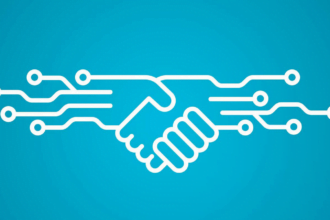Blockchain technology was introduced with Bitcoin, the digital currency. A blockchain is an unbroken log of transactions, each one considered a “block” of information. It’s maintained and shared over a network of distributed computers, but the data is encrypted for security.
But the blockchain concept is rapidly expanding beyond the cryptocurrency universe. Here’s how other professions are adopting blockchain to particular business needs for more efficient data sharing.
Recruitment
Locating and onboarding new talent is a constant chore for HR departments in every company. Blockchaining can provide you with a secure but flexible informational source. It’s changing the way businesses recruit employees in the information age.
A CareerBuilder survey of over 2,500 hiring managers found that 58 percent had caught applicants lying on their resumes. This makes it more difficult for you to find the right people to fit your business.
Having some form of verification system in place would reduce much of the risk and save valuable time in evaluating candidates. Blockchain technology would essentially let participating companies maintain a database of employees, along with their skills, duties, education, and history.
You could then compare an applicant’s claims against the experience and credentials that have been validated in the past. This could include a registry of diplomas, certificates, and other honors job seekers might list on their resumes.
Immediate fact-checking against an extensive blockchain of information could transform the screening and hiring process for companies of all sizes, and at a relatively low cost.
Contract Management
A solution for organizing and validating contract information could also prove highly beneficial for businesses of all kinds, such as in the construction or technical industries. A smart contract makes it possible for you and another party to exchange goods or services in a legally binding way, without the need for third party oversight.
Any business agreement and the elements that go into it, like insurance requirements, delivery, payment terms, and more, could be included in a blockchain. This would form an ongoing record that guides your company in future negotiations and contracts.
Contract management via blockchain technology would also allow companies to optimize the performance of their supply chains. This will allow your company to better evaluate vendors and obtain higher value and shorter lead times.
Decentralized records with fixed electronic protocols would serve as a reliable means of validating the credit, qualifications, and performance of prospective business partners. Sellers could use a blockchain-based smart contract system to automate order fulfillment, or in particular the exchange of payments through digital currencies.
Fintech
Blockchain technology is still widely used for most cryptocurrency transactions. As more companies and consumers adopt these payment methods, it could become a standard method of payment that doesn’t require you to pay for processing services or special software. This means lower costs and potential savings for users.
Every company seeks ways to streamline their business operations. More efficient processes lead to improved time management, and to greater productivity and profitability.
The automation and integration of financial tasks into one platform will improve your cash flow and record keeping while freeing up employee time. Blockchaining will lower the cost of processing any digital transactions.
At present, the majority of business is done using debit/credit cards, a form of digital currency. Including the capacity to process cryptocurrency into the mix will allow your company more flexibility in accepting payments. It will also encourage more sales with a new generation of consumers.
Digital Marketing
The current state of digital marketing is that major internet companies such as Google or Facebook control much of the advertising that takes place. Incorporating blockchain technology into this marketing could change the situation dramatically.
The blockchain model allows a level of security and transparency that would enable marketers to quickly assess audience factors such as demographics. This can be done with an efficiency that could save you millions of dollars annually.
Blockchaining can accomplish this through tracking the use of Basic Attention Tokens, which allow end users to get paid for the ads they view, while the advertiser sells directly to the public. This would effectively put the consumer back in control, vs. the present method of bombarding users with targeted ads based on personal information that’s been captured.
This trend has only made marketing more difficult as users get fed up and seek more confidential channels. A reputation for exploiting personal information has also backfired on companies by damaging their brand.
With an encrypted blockchain, users can view the content they choose without marketers monitoring and accessing their viewing habits.
Instead, the public can decide who gets their information, for how long, and when. Digital marketers may have less data to go on, but it will be more accurate. One upside is that your company can be confident that ads are reaching the right people, so that marketing funds bring better responses.
Consumers and advertisers alike will benefit from blockchain technology in the digital marketing environment.
Blockchaining is a versatile technology that can be applied to business practices of many kinds. The benefits of secure and distributed tracking of information will improve the productivity of HR, marketing, payment processing, contract management, and more. Best of all, it can be done at lower cost than current solutions. These are important benefits that can be passed on to your customers.










